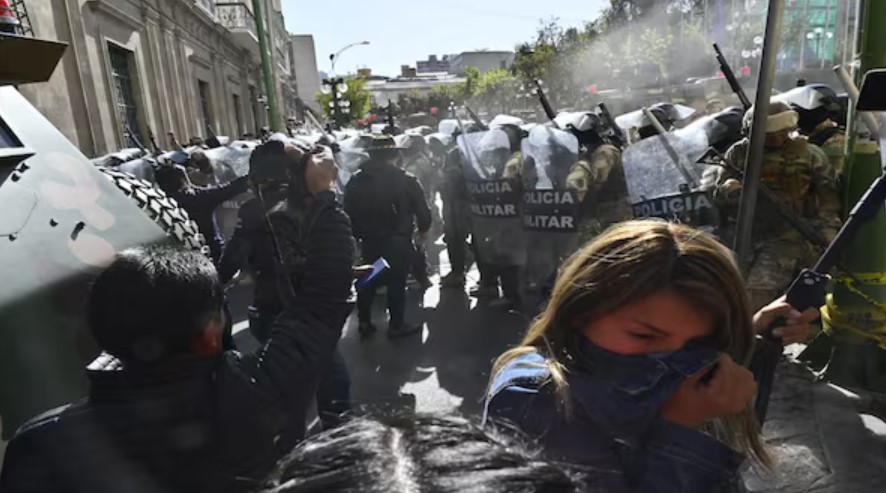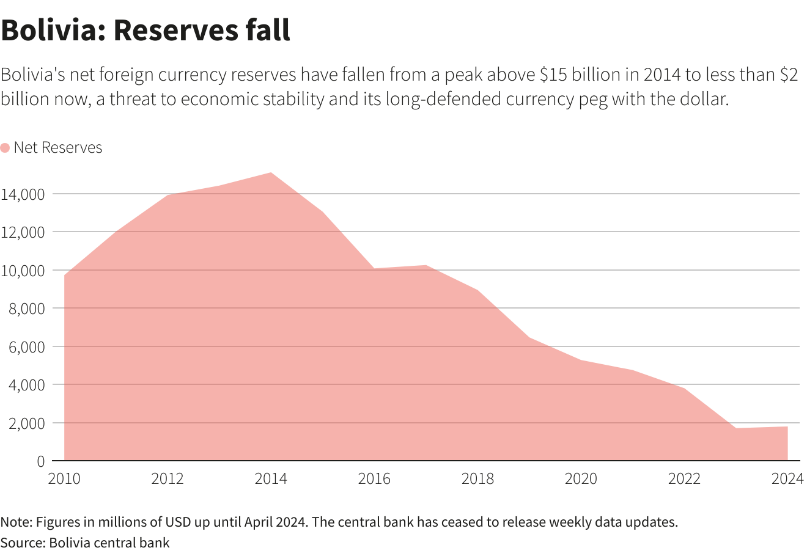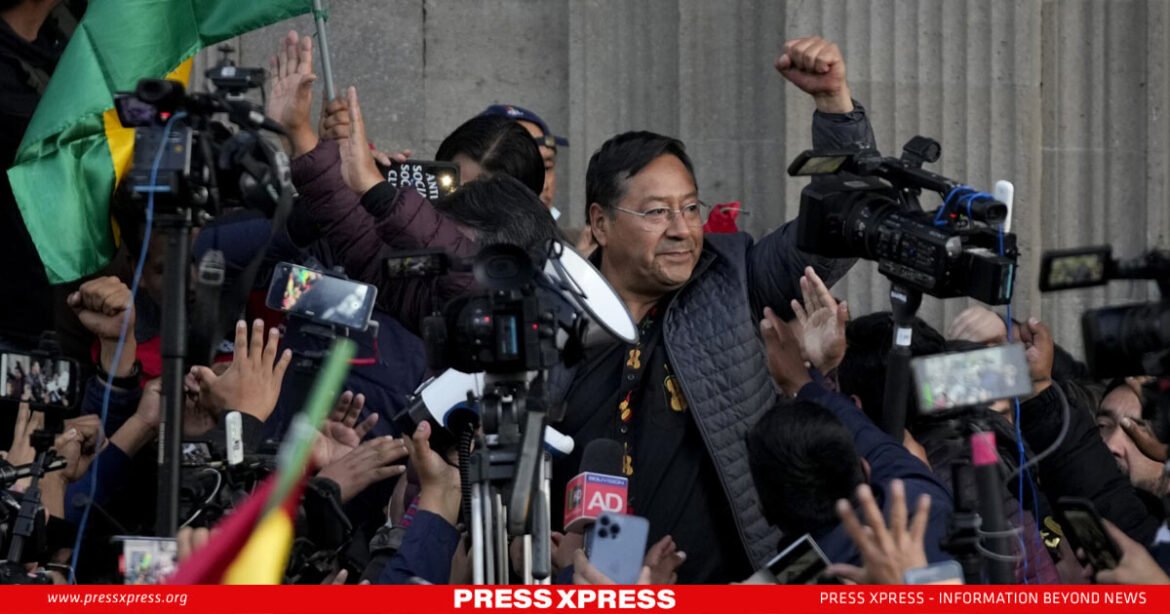On June 26, 2024, Bolivia experienced a dramatic and short-lived coup attempt that highlighted the ongoing political instability in the country. The event unfolded when a group of high-ranking military officials, led by army chief Gen. Juan José Zúñiga and former navy Vice Adm. Juan Arnez Salvador, launched an assault on Bolivia’s government palace.
President Luis Arce swiftly condemned the action as a coup attempt, rallying support from loyal factions within the military and civilian population. Despite the initial violence, the rebellion proved remarkably short-lived, lasting only three hours before the insurgent troops retreated. In the aftermath, thousands of Arce’s supporters flooded the square outside the palace, celebrating the rapid collapse of the coup attempt and reaffirming their commitment to democratic governance.
You Can Also Read: COULD US-CHINA ‘TRACK TWO’ TALKS EASE NUCLEAR TENSION?
The military’s swift action in arresting the coup leaders, including Gen. Zúñiga and Vice Adm. This event exposed deep-seated tensions not only within the military but also in the broader political landscape of Bolivia.
The attempted coup occurred against a backdrop of severe political and economic crises that had been brewing for months. At the heart of these tensions was a bitter power struggle between President Arce and his former ally, ex-president Evo Morales. Once united in their leftist ideology, the two had become locked in a fierce battle for control over the ruling Movimiento al Socialismo (MAS) party. This internal conflict had effectively paralyzed the government’s ability to address Bolivia’s mounting economic challenges.
The coup attempt seemed to reflect the military’s growing frustration with this political deadlock and economic mismanagement. The leaders’ stated aim to ‘restore democracy’ hinted at a deeper dissatisfaction with what they perceived as years of elite control and ineffective governance.

What Led to the Coup Attempt in Bolivia?
Bolivia’s people have been struggling with slow growth, high prices, and not enough dollars. This is very different from the good times they had before.
In the 2010s, Bolivia’s economy grew by more than 4% almost every year, driven by high commodity prices and strong demand for its natural gas exports. But things got bad when the COVID-19 pandemic hit, exposing underlying weaknesses. Problems started earlier though, in 2014. The prices of things Bolivia sold dropped, so the government used its saved-up money to keep spending. Then it used its gold and even sold bonds to get more money, a strategy that proved unsustainable in the long run.
Arce was in charge of money for most of the good years, working for President Evo Morales. When Arce became president in 2020, he faced big money problems from the pandemic. Bolivia couldn’t make as much gas as before, which hurt its economy.
Now, Bolivia is out of money. People wait in long lines to get gas for their cars. This year, experts think Bolivia’s economy will only grow by 1.6%. This would be the slowest growth in 25 years, except for 2020 when COVID-19 hit.
With all these money problems, President Arce and former leader Morales are fighting for control of the ruling party. This fight has stopped the government from fixing things. For example, Morales’ friends in the government won’t let Arce borrow money to help, fearing it would give him too much power. The political deadlock has paralyzed decision-making at a time when swift action is needed to address the economic crisis.

Bolivia’s History of Coups
Bolivia has had more than 190 coup attempts and revolutions since its 1825 independence in a repetitive cycle of conflict between political elites in urban areas and disenfranchised by mobilized rural sectors.
This isn’t even the first alleged coup attempt in recent years. In 2019, Morales, then Bolivia’s first Indigenous president, ran for an unconstitutional third term. He won a contested vote plagued by allegations of fraud, setting off mass protests that caused 36 deaths and prompted Morales to resign and flee the country.
An interim government from the right-wing opposition took control, led by Jeanine Áñez and Morales’ Movement for Socialism, known by its Spanish acronym MAS, called it a coup.
Arce, Morales’s chosen successor, won the election pledging to restore prosperity to Bolivia, once Latin America’s mainstay source of natural gas.
How did Bolivian Leaders and People Respond?
Massive international condemnation and the people’s solidarity in favor of Arce played a role in foiling the coup attempt. Some Bolivian citizens took to the streets in protest against the attempted coup.
President Arce addressed the country’s citizens in the aftermath of the coup attempt. He said, “Many thanks to the Bolivian people, Long live democracy.”
Conservative ex-president Anez, who remains in jail, rebuked the army’s actions. She posted on X: “I fully reject of the mobilization of the military in the Plaza Murillo attempting to destroy constitutional order,” adding “the MAS with Arce and Evo must be got out through the vote in 2025. We Bolivians will defend democracy.”
Some Bolivians said, “They are playing with the intelligence of the people, because nobody believes that it was a real coup”.
How did Other Countries React?
The coup attempt drew international condemnation, with world leaders calling the Bolivian army’s actions illegal. Leaders from Chile, Ecuador, Peru, Mexico, Colombia and Venezuela said it was wrong and that Bolivia should keep voting for its leaders. This swift condemnation reflected a regional consensus on the importance of democratic stability.
Brazil’s president, Lula da Silva, said he wants democracy in all of Latin America, emphasizing the need for regional solidarity. Mexico’s president, Andres Manuel Lopez Obrador, said he supports President Arce, recalling Mexico’s role in providing asylum to Morales in 2019.
The United States said it was watching what was happening in Bolivia carefully, calling for calm. This cautious response reflected the complex history of U.S. involvement in Latin American politics. The United Nations leader, Antonio Guterres, was very worried and asked everyone, including the army, to follow the rules and keep peace, highlighting the international community’s concern about Bolivia’s stability.
After the failed coup, Bolivia now has to fix its political problems and also the money and social issues that made people unhappy. This shows that Bolivia needs to talk more, have better leaders, and fix its economy to stop more problems in the future. The country faces the challenge of diversifying its economy, reducing dependence on natural resources, and addressing longstanding social inequalities to build a more stable and prosperous future.


